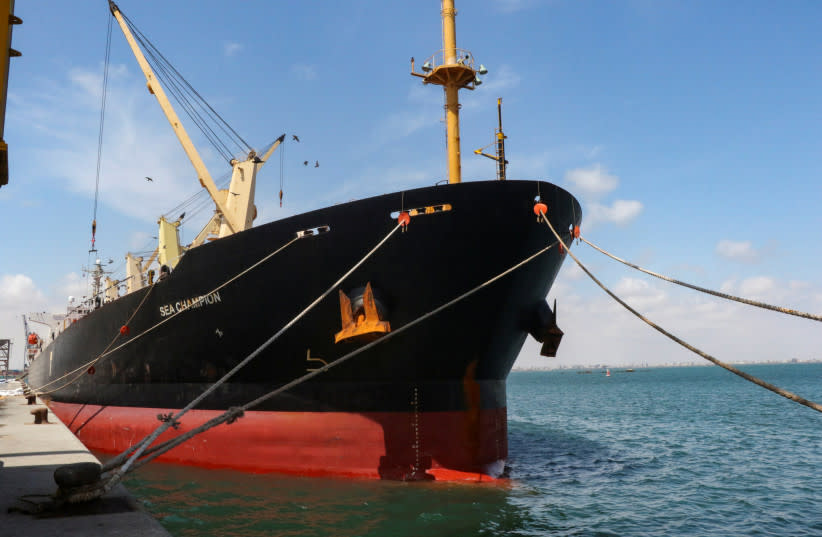While the Western world is obsessing about Israel, Gaza, and Lebanon, the real threat to the Western world is coming from the Iran-backed Houthis in Yemen.
The Houthis are targeting world shipping through the vital Bab el-Mandeb straits at the tip of the Red Sea, severely restricting trade through Egypt’s Suez Canal and, of course, Israel’s port of Eilat.
Blocking shipping through international waters is a casus belli—a legitimate trigger for war. Egypt’s closing of the Straits of Tiran at the other end of the Red Sea set off the 1967 Mideast War.
But now, Houthi militias fire rockets, missiles, and drones at ships they believe have ties to Israel, the US, or other perceived enemies, and not enough is done to stop them.
Occasionally, to keep up the charade that this is about Israel and Gaza, the Houthis launch a missile toward Israel.

This Islamist terrorism has been going on for nearly a year. As you read this, there is a crippled oil tanker in the Red Sea, hit by a Houthi missile, with the potential to turn into an environmental disaster.
There are American and other warships deployed in the Red Sea area, and there have been dozens of American and allied airstrikes against Houthi targets in Yemen. But their operations are just reactional, not counter-offensive. The undeterred Houthis continue to control the straits.
The Western response to this blatant violation of international law has been inadequate, even pitiful at times. A Houthi missile that killed an Israeli in Tel Aviv in July triggered the only significant counterstrike—an attack on the
Yemeni port of Hodeida, the main transit point for Iranian arms, ammunition, and rockets for their Houthi proxies.
The fires there burned for days. Does it need mentioning that this attack was carried out by Israel, and it set off condemnations from the West?
Let’s get a few facts straight here:
Yemen is a nation of 34 million people. After a decade of civil war, it is split between the recognized government in half the country and the Houthi “rebels” in the other. The air quotes mean they’re not really rebels—they’re Iran-backed terrorists responsible for death and destruction all over Yemen. About 377,000 people, most of them civilians, have been killed in fighting since 2014.
The Houthis, like their Iran co-stooges Hezbollah in Lebanon, are Shiite Muslims, and they care little about the Palestinians. They have boarded the anti-Israel train that gives them a free hand to carry out their actual policy—Shiite Iran’s war against the Sunni majority in the Arab world. For years, the Yemen civil war was a two-sided proxy fight between Iran and Sunni leader Saudi Arabia. Iran won. Today, we are suffering the consequences.
The Houthis have not stopped all shipping through the Bab el-Mandeb straits. They target “only” ships they believe are tied to Israel, but the effect is the same as targeting them all. Insurance companies have hiked up their rates for Red Sea shipping, and some have the unmitigated gall to require shipping companies to declare formally that they have no ties to Israel and their ships have not docked in Israel for a full year.
One would think that the last point, requiring such a declaration of freedom from Israeli “contamination,” would be enough to set off a worldwide response to stop this criminal, terrorist activity. But no.
Instead, bright minds are coming up with alternatives. There’s a plan out there to redirect shipping from the Far East over the Arctic Circle and then down to Europe. Seriously. That would give Russia, not the West’s greatest friend at the moment, easy access to disrupt shipping, but that doesn’t seem to bother these geniuses.
The problem, it seems, is the Western aversion to “escalation.” On that misused concept, I ran across this comment on antisocial media:
Anyone who criticizes the attack on Hezbollah operatives using pagers and walkie-talkies without condemning
Hezbollah's firing of thousands of rockets that have emptied out Israel's north and caused extensive destruction in formerly peaceful communities is biased beyond repair.
Anyone who talks of "escalation" for an operation that disabled thousands of terrorists (yes, anyone with a
Hezbollah pager or walkie-talkie is, by definition, a terrorist) while harming very few civilians and damaging practically no property needs to look up the word "escalation."
Anyone who assumes that it's a God-given right for terrorists to retaliate for operations against their terrorism needs to re-examine their values.
OK, full disclosure—I wrote that and posted it myself. Unfortunately, those points still need to be made.
The Western revulsion at the concept of “escalation,” which apparently means anything the West and especially Israel do to stop terrorism, probably has the ayatollahs in Iran laughing out loud. They can do whatever they want, directly or through their proxies, and their enemies invariably respond with calls for restraint “from both sides.”
Does this mean that the only solution to Iran-backed Islamist terrorism is military force? Not necessarily. But it will take more than defensive, reactive missions to get the attention of the Houthis (and Iran) and restore free shipping through the Red Sea. After all, free shipping is a bedrock principle of international law.
It certainly does not mean that Israel has to take this on by itself, doing the West’s dirty work—and absorbing retaliation from its enemies and condemnation from its allies.
This is a job for the West. It has little to do with Israel. It’s about fighting for values, freedom, and accountability—even if the fighting is actual fighting. It’s time for the West to get serious about protecting itself from Islamist terrorism wherever it appears.
Correspondent Mark Lavie has been covering Israel and the Mideast since 1972. His second book, “Why Are We Still Afraid?” recaps his career and comes to a surprising conclusion.
